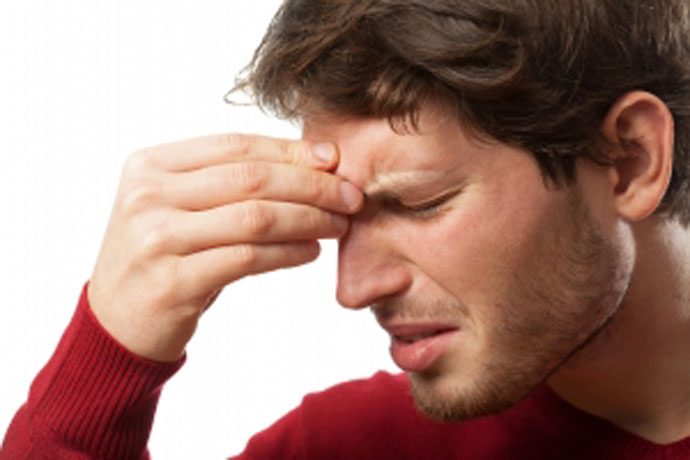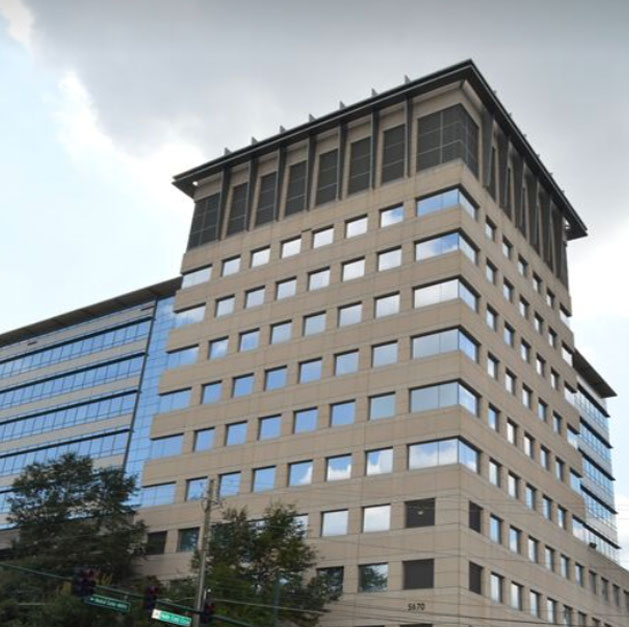What Causes a Sinus Infection?

You’ve got a sore throat, fatigue, loads of nasal congestion, and almost unbearable pain behind your eyes, cheeks and forehead. Ugh. You feel totally miserable. This sure doesn’t feel like your run-of-the-mill cold. And it probably isn’t.
These symptoms, along with a fever, coughing, postnasal drip, toothaches, ear pain, an aching jaw, bad breath, loss of smell, and a sore throat, are all indicators of a sinus infection (or “sinusitis”). While many of these symptoms can also be seen with a cold, it they continue for more than 10 days, it’s very likely to be a case of sinusitis.
Sinusitis is an inflammation (or swelling) of your sinuses—the bony cavities found behind your nose, eyes, brows and cheekbones. Normally, your sinuses are filled with air. When the sinuses become blocked, too much mucus builds up, trapping bacteria that multiply inside. This leads to infection.
There are four different types of sinusitis: acute, when symptoms last for four weeks or less; sub acute, which last four to 12 weeks; chronic, which lasts for 12 weeks or longer (and may continue many months or even years); and recurrent, which involves several acute attacks within a year. The symptoms for all types of sinusitis are basically the same; however the symptoms are usually most severe with acute inflammations.
Several conditions can cause sinus infections. Often it’s due to the common cold or allergies, either of which can cause the body to produce too much mucus, creating a blockages in the openings of the sinuses so that mucus cannot drain out. A deviated nasal septum (when the bone and cartilage that divides the nasal cavity is off-center or crooked), nasal bone spur (bony growths in the nasal cavity), or nasal polyps (soft, sac-like growths in the lining of the nose or sinuses) may also block the openings of the sinuses.
What’s the treatment? If you’ve got acute or sub acute sinusitis, the infection usually goes away without medical therapy. However, over-the-counter medications may be taken—nasal corticosteroid sprays to reduce sinus inflammation, decongestants to dry up mucus, and acetaminophen or ibuprofen to relieve sinus pain. For severe acute sinusitis infections, your physician may prescribe antibiotics, anti-fungal medications or allergy shots, depending on the underlying cause of the sinus blockage.
With chronic sinusitis, all of the remedies just mentioned may help relieve discomfort. Surgery may also be recommended. One option is endoscopic sinus surgery. In this procedure, an endoscope (a thin, flexible tube with an attached light) is inserted into the nose to provide the surgeon an inside view of the sinus passages. Lasers or other surgical instruments are used to remove small amounts of bone, growths (such as polyps), or other material that is blocking the sinus openings.
Another option is Balloon Sinuplasty™. This is a minimally-invasive, in-office procedure using a small sinus balloon catheter to open up blocked sinus passageways and restore normal sinus drainage and function.
The fact is, there are many options for treating sinus infections. There’s no reason to suffer. If you’re experiencing severe or frequent bouts of sinusitis, or if you’ve had your sinus problems for many weeks and they’re not getting any better, please make an appointment with the Sinus Institute of Atlanta to discuss your treatment options.
Why are Sinus Infections Common in the Winter?
Growing up, you may have been told by your mother or grandmother that being outside in cold weather will make you sick. While this theory has been mostly debunked, that doesn’t change the fact that people are still more likely to get a sinus infection during winter than other times of the year. But why?
During the cold weather months, people spend more time indoors with the windows sealed, so they are more likely to breathe the same air as someone who is sick. As people are exposed to others for prolonged periods of time, their exposure to germs increases. The more time spent inside at work or at home, the more likely people are to touch more surfaces, cough in more rooms, and sneeze in more hands. As a result, cold and flu viruses are more likely to be transmitted to others and the occurrence of infection increases. Being sick with the cold or flu can lead to excess mucus in the nasal passages and a weakened immune system, which can result in increased cases of sinus infections as well.
It is also important to consider the effect of heaters on the nasal passages. Winter air is naturally drier than summer air. When central heating is used, it creates an even drier environment, resulting in increased dehydration and thicker mucus. This thick mucus is much more likely to become lodged in the sinuses and can cause pressure and infection.
People are often exposed to more allergens during the winter, which can further exacerbate problems. Christmas trees and garlands frequently introduce mold into a home’s air. Holiday decorations that have been stored for most of the year can accumulate dust that is reintroduced during the winter. Scented candles and home fragrances that are often used this time of year can increase irritation. Because pets are more likely to be spending longer periods of time indoors, they can also contribute to sinus problems.
To avoid sinus infections this season, be diligent about washing your hands and keeping household surfaces clean. Stay hydrated by drinking plenty of fluids, and try using a humidifier during the night. Keep carpets and furniture free of pet hair and dust by vacuuming regularly. If you begin to experience sinus irritation, stay home to reduce exposure to others. Getting plenty of rest, using decongestants, and performing nasal irrigation can ease the discomfort that usually follows a sinus infection.











